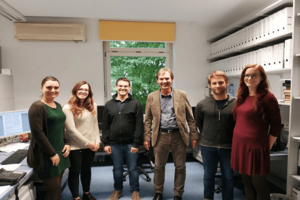Psychosocial and psychological interventions reduce relapse risk in schizophrenia
Dr. Helena García-Mieres from the IRSJD has collaborated in an international study, led by researchers from the Technical University of Munich and the University of Catania, which has analyzed the results of different studies on relapses in schizophrenia to check the efficacy of psychological and psychosocial interventions for its relapse prevention. This collaboration is due to a research stay funded by the European College of Neuropsychopharmacology. The study has been published in The Lancet Psychiatry.
Schizophrenia is one of the most debilitating disorders worldwide. It is a chronic and severe psychiatric illness characterized by delusions, hallucinations, and cognitive dysfunction. It appears to be caused by a complex interaction between genetic and environmental factors.
Currently, schizophrenia is treated with antipsychotic medication combined with psychological and psychosocial interventions. However, even if patients respond well to initial antipsychotic treatment, symptoms of schizophrenia often recur. The return or worsening of symptoms after a period of remission is called relapse. In fact, according to a study by the Cochrane, 24% of patients relapse within one year despite drug treatment.
Relapses are associated with an increased risk of suicide for those affected, a loss of productivity and higher costs for hospital admissions. A situation with a high impact on patients, their families and society.
On the other hand, even though antipsychotics are effective for the prevention of relapses, they are associated with considerable side-effects such as weight gain, psychomotor disorders, sexual problems, or cardiovascular risks. For this reason, in parallel, various psychosocial and psychological interventions are carried out for people with schizophrenia, despite their comparative efficacy in preventing relapses of this disease is unknown.
The 3 most effective psychosocial and psychological interventions to prevent relapses in schizophrenia
The aim of this international study is to evaluate the efficacy, acceptability, and tolerability of psychosocial and psychological interventions for relapse prevention in schizophrenia. So, the research team has systematically analyzed and reviewed more than 70 different trials and studies that examinates psychosocial and psychological interventions with the aim of preventing relapse in patients with schizophrenia.
Thanks to this statistical analysis, researchers have been able to see that family interventions, cognitive-behavioral therapies and family psychoeducation are the three psychosocial and psychological interventions that reduce the risk of relapse the most compared to other modalities of psychological intervention and the usual psychiatric treatment in a year.
"The results are very positive: they show that these three interventions should be the first option to consider in the treatment to prevent long-term relapses in patients with schizophrenia" comments researcher Dr Helena García-Mieres, post-doc researcher of the Etiopathogenesis and treatment of severe mental disorders (MERITT) group · Parc Sanitari Sant Joan de Déu.
What are psychosocial and psychological interventions?
Reference paper
Irene Bighelli, Alessandro Rodolico, Helena García-Mieres, Gabi Pitschel-Walz, Wulf-Peter Hansen, Johannes Schneider-Thoma, Spyridon Siafis, Hui Wu, Dongfang Wang, Georgia Salanti, Toshi A Furukawa, Corrado Barbui, Stefan Leucht, Psychosocial and psychological interventions for relapse prevention in schizophrenia: a systematic review and network meta-analysis, The Lancet Psychiatry, 2021, Nov;8(11): 969-980, DOI: https://doi.org/10.1016/S2215-0366(21)00243-1.

Family interventions, cognitive-behavioral therapies and family psychoeducation are the three psychosocial and psychological interventions that reduce the risk of relapse the most.

